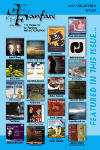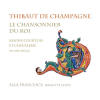Texte paru dans: / Appeared in:

Fanfare Magazine: 36:6 (07-08/2013)
Pour
s'abonner / Subscription information
Les abonnés à Fanfare Magazine ont accès aux archives du
magazine sur internet.
Subscribers to Fanfare Magazine have access to the archives of the magazine
on the net.
Aeon
AECD1221

3760058360217(ID264)
Consultez toutes les évaluations recensées pour ce cd
~~~~ Reach all the evaluations located for this CD
Alla Francesca’s latest album consists of 16 selections, including 11 vocals, and five instrumentals. The first group derives from a single, if problematically complex, source: the so-called Chansonnier du roi, or Songbook of the King. It began life as an anthology of roughly 450 trouvère songs, more than 50 troubadour songs, and various several lays, and approximately 50 medieval motets and lyric songs. Started in the mid-to-late 13th century, it was completed around 1300. At some point a libellus of 60 chansons by Thibaut that had been in some sense supervised by the composer (who could certainly afford it; he was Count of Champagne and later King of Navarre, after all) was added to it, after his death. It is these that provide our songs. The instrumentals include arrangements of three relatively late period dances, and a pair of medieval polyphonic secular motets whose tenor, motetus, and triplum are all stripped of their voice parts.
Elizabeth Aubrey in her detailed The Music of the Troubadours only mentions Thibaut in passing, but that’s to be expected: He was a trouvère, writing in Old French rather than like the troubadours, writing in Occitan. As with many similar artists of the time, he created both the poetry and music of his works. These included chansons of courtly love, humor, and war, pastourelles, and religious songs. That a person of his inclination and talent matured at the court of Champagne is not surprising. Eleanor of Aquitaine was a prominent enthusiast of secular chansons, and one of her daughters with Louis VII, Marie, became countess of Champagne. Marie in turn proved to be as great a lover of songs as her mother, supporting a range of poets (notably Chrétien de Troyes) and trouvères (Gace Brulé and Conon de Béthune). Marie’s sons cared more about the Crusades than music, but the culture she encouraged had persisted, and her grandson was our Thibaut.
Alla Francesca was founded in 1990. The group’s discs have been repeatedly reviewed in Fanfare’s pages over the years. They are a prolific ensemble, with 13 albums to their credit, and have maintained over time a focus on secular music of the Middle Ages and Early Renaissance, up through the 15th century. The ensemble is jointly led by Brigitte Lesne and Pierre Hamon, but his name appears nowhere on this latest release. Instead, we have a group of five musicians who provide voice, harp, percussion, lute, cittern, and viele. In a performance genre where ensemble vocalists are too often notable for their instrumental virtuosity rather than their voices, Alla Francesca stands out for the quality of its singers. Brigitte Lesne’s tone sounds as though it has thickened a bit over the years when compared to the group’s work a decade ago and more on Opus 111 (Landini; Beauté parfaite; Richard Coeur de Lion), but she still enunciates clearly, and characterizes well. Also performing the songs are Pierre Bourhis and Emmanuel Vistorky, who offer strong tone, good range and breath support, with a vivid sense of theater. This last is important in music that many scholars believe was not meant to vary its instrumental accompaniment from verse to verse.
The engineering is close, and well balanced. Original texts in Old French are offered, alongside translations into modern French and English. Alla Francesca hasn’t been recording much of late. Let’s hope their busy performance schedule will include more trips to the studio in the future.
Cliquez l'un ou l'autre
bouton pour découvrir bien d'autres critiques de CD
Click either button for many other reviews


